Five Israelis were killed in a frenzied assault by two Palestinians who targeted worshippers at a Jerusalem synagogue, the latest in a series of deadly attacks that many fear is pushing the city to the edge of a dangerous escalation in violence.
Four of the people killed were rabbis, three holding joint US citizenship, one with dual British citizenship. The fifth victim was an Israeli policeman, who succumbed to his injuries late on Tuesday night.
The attack was greeted by international condemnation, and Israel’s prime minister, Binyamin Netanyahu, vowed to “respond harshly”, describing the attack as a “cruel murder of Jews who came to pray and were killed by despicable murderers”.
The two assailants, cousins Ghassan and Uday Abu Jamal, attacked the worshippers with meat cleavers and a gun during early-morning prayers before they were killed by police officers. The circumstances of the incident have added to the sense of crisis in Jerusalem.
Witnesses described a chaotic and bloody scene inside the synagogue as police and the attackers engaged in a shootout at the building’s entrance. Photographs distributed by Israeli authorities showed a man in a prayer shawl lying dead, a bloodied butcher’s cleaver on the floor and prayer books covered in blood.
Many in Israel have been alarmed by the religious dimension to the killings. Violence in Jerusalem, areas of Israel and the Israeli-occupied Palestinian territories, has surged in recent months, exacerbated by tensions over a key holy site revered by Muslims as the Noble Sanctuary and Jews as the Temple Mount.
Prominent among those who condemned the killings were the US president, Barack Obama and the British prime minister, David Cameron. Denouncing it as a “horrific attack” Obama told reporters at the White House: “Tragically, this is not the first loss of lives that we have seen in recent months. Too many Israelis have died, too many Palestinians have died.”
Netanyahu called the attack a “cruel murder of Jews who came to pray and were killed by despicable murderers”. In an evening press conference he once again accused the Palestinian president, Mahmoud Abbas, of stirring tension in Jerusalem, and called on the international community to express its outrage.
In the immediate aftermath of the attack Netanyahu ordered the demolition of the homes of the two attackers. Other measures reported to be under consideration by the public security minister, Yitzhak Aharonovitch, were the loosening of firearms regulations to allow security personnel to carry guns off duty and the reported establishment of security checks on those leaving Palestinian neighbourhoods of the city.
The US consulate in Jerusalem identified the dead Americans as Aryeh Kupinsky, Kalman Ze’ev Levine, and Moshe Twersky. Israeli authorities said the British man killed was Avraham Goldberg, 68, who had emigrated to Israel in the 1990s. The policeman who was killed was Zidan Saif.
The four rabbis were buried on Tuesday afternoon in funerals attended by several thousand people and by senior political figures. Relatives in the east Jerusalem neighbourhood of Jabal Mukaber later said the attackers were the cousins Ghassan and Uday Abu Jamal, who burst into the Kehillat Bnei Torah synagogue in Har Nof. Israeli media reported that one of the two assailants had worked in a supermarket in the area.
Mahmoud Abbas, the Palestinian president, quickly condemned the killings. “We condemn the killing of civilians from any side,” he said in a statement. “We condemn the killings of worshippers at the synagogue in Jerusalem and condemn acts of violence no matter their source.”
But Hamas, the militant Palestinian group that runs the Gaza Strip, praised the attack. In Gaza, dozens of people took to the streets to celebrate, with some offering trays full of sweets.
The Popular Front for the Liberation of Palestine, a small militant group, said the cousins were among their members, though it did not say whether it had instructed them to carry out the attack.
Speaking to journalists at the scene, Jerusalem’s mayor, Nir Barkat, expressed shock at the brutality of the attack. “To slaughter innocent people while they pray ... it’s insane,” he said.
In a bleak assessment of the wave of violence, the Israeli justice minister, Tzipi Livni, told Army Radio that she had long feared that a religious war was developing. “And a religious war cannot be solved.”
In Jabal Mukaber relatives of the two attackers offered theories about the motives for the attack, with some linking it to the death of a Palestinian bus driver found hanged behind his bus, described by Israeli authorities as a suicide but widely believed by many Palestinians to have been a lynching.
Other family members, however, blamed recent friction at the Temple Mount which has been blamed for a rash of deadly violence and clashes.
A cousin of the men, Sufian Abu Jamal, a construction worker aged 40, described the attack as a “heroic act and the normal reaction of what has been happening to Palestinians in Jerusalem and at the al-Aqsa mosque”.
At the house of Uday, “Abu Salah”, an uncle of one of the men, said his relatives had been made angry by what they had seen on Facebook and television news reports. “It was a situation ripe for an explosion and that is what happened.”
The attack was the latest in a series of deadly assaults. Five Israelis and a foreign visitor have been deliberately run over and killed or stabbed to death by Palestinians. About a dozen Palestinians have also been killed, including those accused of carrying out those attacks.
Residents trace the recent violence in Jerusalem to July when a Palestinian teenager was burned to death by Jewish assailants, an alleged revenge attack for the abduction and killing of three Jewish teens by Palestinian militants in the occupied West Bank.
The US secretary of state, John Kerry, said the attack was “a pure result of incitement”. In an emotional statement in London, Kerry added: “Innocent people who had come to worship died in the sanctuary of a synagogue. They were hatcheted, hacked and murdered in that holy place in an act of pure terror and senseless brutality and murder.”
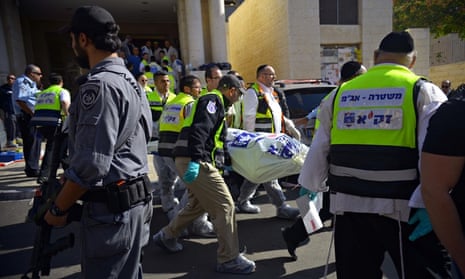
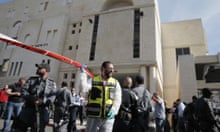
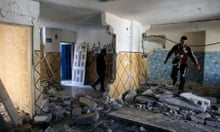
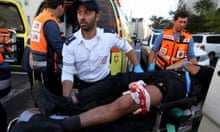
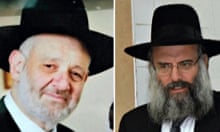
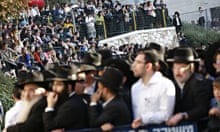

Comments (…)
Sign in or create your Guardian account to join the discussion